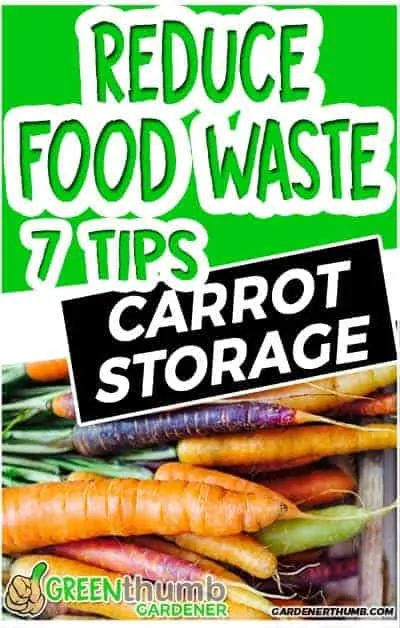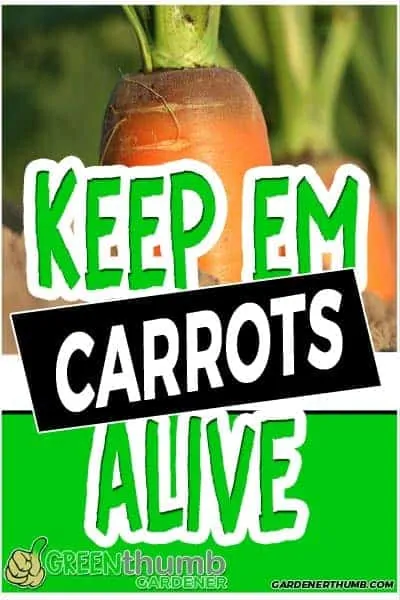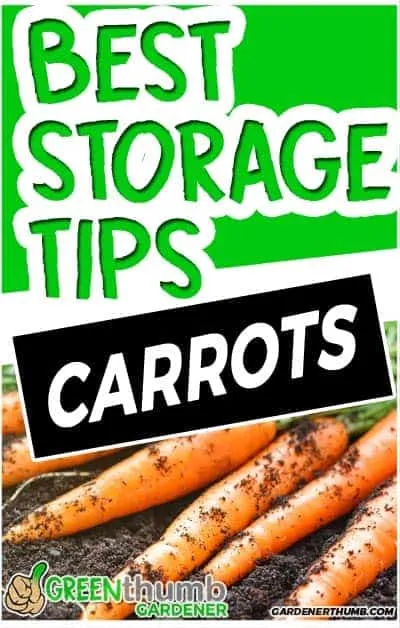How Long Do Carrots Last | Best Storage Tips
Last updated: 01/27/21
Carrots are so tasty when you grow them yourself or if they are fresh to the market. You can take certain precautions when you store carrots in order for them to maintain their taste and nutritional value.
Even Bugs Bunny took care of his carrots to make them last longer, or maybe he just ate them quickly.
You will learn the shelf life of carrots, plus some tips on how to make carrots last longer.
Green thumb Gardener occasionally links to product and/or services offered by vendors to assist you with all your gardening needs. Some of these may be affiliate links, meaning we earn a small commission if items are purchased.
Want to Download a Garden Hack Guide for FREE

Enter your email below and we will send you a guide to help you SAVE money in your garden.
The shelf life of carrots depends on the different storage methods that you follow. Carrots that are freshly harvested will last for 3-5 weeks in the fridge. Cooked ones will last for approximately 3-5 days in the fridge.
Frozen carrots will last for 10-12 months in the freezer.
There is more to just placing carrots in your pantry. We will teach you the many different ways to extend how long carrots last. Our suggestions are based on the premise that you properly follow the practices of food preservation.
As always, use your best judgment when trying to determine when something is spoiled. Let’s delve into the 7 tips to save your carrots from spoiling too early.
1- How Long Do Carrots Last at Room Temperature | Shelf Life of Carrots
Bacteria grow rapidly at temperatures from 40 to 140 degrees Fahrenheit. You should not leave carrots out at room temperature for too long. Carrots last approximately 2-4 days at room temperature before they will start to spoil.
Carrots can quickly get spoiled, and at 12-24 hours may be enough to make them less tasty and lose its texture.

2- How Long Do Carrots Last In The Fridge
Whole raw carrots can last for about 3-5 weeks in a refrigerator. Baby carrots last 1-2 weeks shorter than adult carrots – they are more delicate and have a weaker protective skin.
Refrigeration is the way to go if you are not after long-term storage of your carrots.
3- How Long Do Carrots Last In The Freezer
When frozen, carrots can last quite a long time – they will maintain excellent quality for 10-12 months if properly stored. After that, they may still stay safe to eat, but they will no longer be the same as when fresh.
Before freezing, carrots should be blanched. Carrots that haven’t been blanched before freezing remain safe to eat, but they will develop “off” textures, flavors, colors, and may lose their nutritional value.
4- How Long Do Carrots Last When Cooked
When properly stored, cooked carrots can last for 3-5 days in the refrigerator. Well, you shouldn’t expect much from cooked carrots – you’ve cooked them because you are ready to eat them, right?
Thus, if you want to keep carrots edible as long as possible, only cook them when you are intending to consume them.
5- How to Store Carrots the Right Way
Proper storage is key if you want to ensure that your carrots stay edible for weeks and even months. There are many ways in which you can store carrots, but let’s overview two – one for regular refrigeration and another for maintaining that fresh crunchiness.
Refrigeration
Prepare the carrots for storage
First, remove the greens from the carrots as soon as possible – these will draw moisture away from the carrot. Allow the carrot’s outer skin to dry under the sun for a day or so. Do not wash the carrots before storage since the moisture could cause them to spoil earlier. Wash the carrots just before use.

Refrigerate the carrots
Put the carrots in a plastic bag and place the bag in the coolest part of your refrigerator, which probably is the vegetable drawer.
Some people think that lining the bottom of the vegetable drawer with a thick layer of absorbent kitchen paper allows you to maintain the freshness of the carrots for a longer time. This may be helping because the paper absorbs the moisture coming out of the carrots, thus protecting the food from spoilage.
Check on the carrots every once in a while
Check on the carrots one-two times per week. You need to ensure that the paper lining at the bottom of the vegetable shelf is dry. If the paper is damp, replace it.
The Water Bowl Method
This method is suitable for maintaining the freshness and crunchiness of carrots, but it doesn’t work in the long term. After 2-3 weeks, carrots stored in this way go slimy and lose flavor.
Here’s how to use the water bowl method:
- Put the carrots in a large bowl. Ensure that there is at least 1 inch of headroom between the carrots and the rim.
- Fill the bowl with clean, preferably filtered water.
- Cover the bowl with plastic wrap or sealable lid.
- Place the bowl into the refrigerator.
- Change the water once a day.
6- How Do You Know When Carrots are Bad | Slimy Carrots & All
You don’t always get expiration dates when buying carrots, so it’s important to consume carrots as soon as possible. With that being said, you should be aware of some telltale signs of carrots going bad, which will be helpful when determining whether your carrots are edible after a long time of storage.
Below is a list of the signs shown by spoiled carrots. Look for them every once in a while since carrots can start to go bad at any moment, even if you think that they should not.
White blush
White blush appears on carrots due to dehydration. Examine the surface of the carrot – if you see tiny white dots all over it, then the carrot has developed white blush. Carrots with white blush are still safe to eat, but they won’t deliver the same taste as fresh carrots.
If you spot white blush on your carrots, consume them as soon as possible since they may become unsafe to eat very quickly.
Black spots
Black spots are caused by a fungus called Alternaria radicina. The growth of this pathogen is encouraged by high temperatures and moisture on the leaves.
Actually, black spots caused by Alternaria radicina aren’t really a sign of rotting – rather, they are a sign of infection. Nonetheless, if you see black spots on your carrots, you may want to avoid eating them, though some people think that cutting the black spots off makes carrots completely safe.
And really, consuming black spots caused by fungi shouldn’t cause any health problems in humans since the plant fungi have evolved to attack plant immune systems. You may still want to stay on the safer side.

Slimy Carrots
If your carrots are slimy, mushy and soft, then they have started to rot. It’s not safe to eat carrots that have a mushy consistency – dispose of such carrots and avoid eating them since they could cause intoxication in you.
Rotten Smell
Needless to say, if the carrots smell rotten, then they definitely are no longer edible. If your carrots give off a rotten smell, then you probably haven’t kept a good eye on them and/or haven’t maintained proper storage conditions. Or maybe you’ve stored them for too long.
Check expiration date
If you’ve purchased carrots at a local store, then chances are that their packaging has the carrots’ expiration date printed on them. This will allow you to avoid any guesswork, but you should still occasionally check your carrots for signs of rotting – improper storage conditions can dramatically shorten their shelf life, and you want to spot mistakes as soon as possible.
7- How to Store Carrots Long Term
Long-term storage of carrots is possible with a few simple methods. Sunlight, oxygen, moisture and elevated temperatures are the culprits when it comes to storing carrots long-term.
You want to minimize this through a few proven techniques.
Freezing Carrots
Freezing is very simple, effective & easy to do if you are looking for a long-term storage solution.
You can freeze carrots either cooked, blanched, or raw. The best method is blanching as it does preserve the flavor and texture best.
It is always best to use a freeze-safe airtight bag to minimize freezer burn or ice crystals from forming.
To blanch and freeze carrots, follow these steps:
- Thoroughly wash the carrots in cold water.
- Bring a pot of water to a boil
- Peel the carrots (optional) and cut them in quarters or smaller pieces depending on what dish you want to prepare.
- Boil the carrots for 3-4 minutes
- Place the blanched carrots in cold water after removing them from the boiling water to stop the cooking process.
- Place the carrots in a sealable freezer container or bag after you dry the carrots.
Freshly Harvested Carrots
Carrots can also be covered in sand after you pick them from the ground. You want to remove the green stems from the carrots, but keep them dry and uncleaned.
Place the carrots in some clean sand and leave in a cool spot that is preferable dark, and ventilated area like your basement. Carrots stored this way will last for about 6 months.
Another option is to just leave them in the ground and cover them with mulch or leaves if the winter is approaching. This should prevent them from freezing.
Storing Cooked Carrots
Cooked carrots need to be stored in airtight containers or resealable plastic bags. The process is the same as outlined in the freezing section.
You may choose to refrigerate or freeze your carrots, but remember that when refrigerated, the cooked ones last much shorter than when frozen – 3-5 days versus 10-12 months.
Drying Carrots
You can dry or dehydrate your carrots if you don’t have enough space in your freezer or refrigerator. To dry them, follow the steps below.
We are going to overview drying carrots in a food dehydrator:
- Clean the carrots and remove any dirt if freshly harvested. It is best to cut any blemishes or imperfections from the carrots.
- Slice the carrots to about 1/8 inch thick. This ensures they will dry in less time.
- Bring a pot of water to a boil and blanch the carrots (see steps above in the Freezing Carrots section).
- Strain and dry off the carrots as best as possible.
- Lay the carrots in the dehydrator and dry at about 125 F for about 8-10 hours.
You can rehydrate the carrots by soaking them in water for 15 minutes & cook them as you would normally.
Pickling carrots
This method involves using vinegar to add flavor which helps to extend its shelf life. Most pickling liquid also includes the usage of salt or sugar to help brine them.
The pickling recipes you may find to preserve carrots will help to make them last a little longer in the fridge. Pickled carrots will last about 10-14 days in the fridge.
Canning Carrots
There are 2 methods of canning that we must differentiate. There is the water bath canning and there is pressure cooking canning. Carrots require the pressure cooking canning method.
Pressure cooking canning methods will ensure that the temperature it is processed or boiled in is well above the temperature to kill off any bacterial spores that can cause botulism. The temperature in a pressure cooker is 250°F or more.
Water bath canning will never reach this temperature, so is not recommended to process carrots. Botulism spores can actually survive normal boiling temperatures so are not quite killed off using this method.
The best guide that we use for canning and pickling is the Ball Complete Book of Home Preserving. You can find this book here.
More Info
Keep in mind that the information that we provide here for carrots are based on recommendations from the FDA, our own observations, and the data from other sources such as the Ball guide we mentioned above. Please do your own due diligence in determining your own set of guidelines.
This information provided is at your own risk. Use your best judgment. We did our best to present you with the best information we had available at the time of this writing.
The shelf lifetimes are based on the following conditions of your storage area:
- Room temperature of 60°- 70°F
- Refrigerator temperature of 35° – 40° F
- Freezer temperature of 0°F or lower.
Check out our guide on ways of preserving food for more information on some of the techniques.
Related Questions
- How long do carrots last out of the fridge? – Carrots stored outside of the fridge last 2 days to 6 months depending upon storage methods.
- Slimy Carrots – Are they ok to eat? – No, carrots that are slimy are not safe to eat
- How long will cut carrots last in the fridge? – Carrots that are cut or have the skin removed such as baby carrots will last for approximately 2-3 weeks in the fridge.








